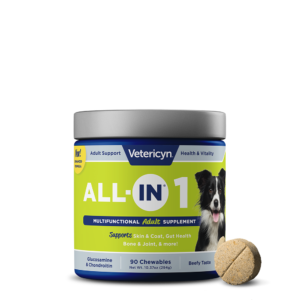You know how you can tell when something is off with your dog but you can’t put your finger on it? Recognizing sick dog symptoms early can mean the difference between wellness and illness for your pup.
Why Spotting Sick Dog Symptoms Early Matters
Dogs can’t tell you they feel sick, so you need to know what to watch for. Sick dog symptoms may start under the radar: maybe your dog’s being extra quiet, skipping meals, or suddenly not interested in fetch. The earlier you notice a problem, the quicker you and your veterinarian can intervene, helping your dog bounce back quickly.
If you’re wondering how to spot signs of illness and what to do about it, you’re in the right place!
Common Sick Dog Symptoms
Recognizing changes in your dog’s behavior and physical state is essential for catching illnesses early. Below are some common symptoms to watch out for:
Appetite Changes
Appetite changes are often the first sign of sickness. Dogs are generally food motivated, so any change in eating habits could be a sign of a sick dog. Not eating, eating less, or suddenly being extra hungry are all sick dog symptoms to watch for.
If you notice your pet drinking more or less water, that could be a sign of sickness.
Unexplained Weight Fluctuations
If your dog gains or loses weight without a change in diet or exercise, it could be a sign they are sick. There are several reasons for unexpected weight changes in dogs ranging from mild to serious problems.
Bathroom Habits
The digestive system can show signs your dog is sick, including excessive drooling, burping, vomiting, retching, flatulence, diarrhea, or straining to defecate.
Any change in urination, such as accidents, urinating more or less, or straining to urinate, suggests your dog may be sick.
Blood in urine or feces is always a red flag for illness.
Breathing Issues
Breathing issues can be a warning sign of a severe sickness. Persistent coughing, wheezing, change in the bark, panting, or difficulty breathing could be a problem with the heart, lungs, nose, or throat, or it could mean there is a systemic disease.
Behavior Changes
If your dog, who’s usually playful, suddenly seems tired, isn’t active, or stops wanting to walk or play, they could be sick or in pain. You should also pay attention if your independent pup suddenly won’t leave your side or if a social dog starts avoiding people.
Sometimes, sick dogs are moody due to pain. A usually friendly dog who growls, cowers, or bites may be sick and in pain. Discover more signs a dog is in pain.
Physical Signs of Illness
Recognizing the physical signs of illness in your pet is essential for their well-being. These signs can indicate minor health issues or more serious conditions that require veterinary attention. Here’s what to look for:
- Joint & limbs – Weakness, swollen joints, limping, or dragging/holding up a limb can mean joint pain, arthritis, injury, or a more serious disease.
- The abdomen – A swollen, firm belly with lethargy and retching could signal bloat (gastric dilation and volvulus), a life-threatening emergency—especially in large-breed dogs. Seek immediate veterinary help.
- Lumps and bumps – Any new swelling, lump, or bump can indicate illness. Your veterinarian should check even small masses.
- The mouth – Excessive drooling, bad breath, or pale gums can mean pain, toxin exposure, dental disease, or other internal issues.
- The eyes – Red or cloudy eyes, and swollen and irritated eyelids are signs of sickness that may be local or systemic. Vision is precious, so be sure to seek care right away if you notice problems with your pup’s eyes.
- The skin – Dull or rough fur, scabs, bald spots, inflammation, swelling, or a bad smell may be early signs of illness. Minor scrapes can often be treated at home, but large wounds or heavy bleeding need prompt veterinary care.

When to Call the Vet
If you notice any of these sick dog symptoms:
- Not eating or drinking for more than a day
- Repeated vomiting, retching, diarrhea, or blood in vomit/feces/urine
- Lethargy, trouble breathing, or seizures
- Sudden limping, joint swelling, or inability to walk
- Weird new behaviors, confusion, or staring into space
Call your veterinarian right away.
Emergencies
Some symptoms are signs of sickness due to a medical emergency, and require immediate intervention to save the animal’s life.
These include (1) respiratory emergencies such as heart failure, choking, anaphylaxis; (2) severe trauma like being hit by a car, an animal attack, burns, penetrating wounds, or broken bones; (3) gastric dilation and volvulus; (4) urinary obstruction; (5) suspected toxin exposure or ingestion; (6) seizures or changes in consciousness, alertness, or balance; (7) uncontrolled vomiting and diarrhea; (8) heat stroke; (9) problems with the eyes; (10) internal bleeding issues with acute lethargy and breathing problems; and (11) intervertebral disk disease with sudden loss of hind limb mobility.
As with other sudden, alarming signs of sickness, take your dog to the veterinarian right away if you notice these.
Supplements for Pet Health
Quality supplements can boost immunity and support overall health. Consider Vetericyn’s All-In for your pup’s supplement needs. This dog supplement is available in puppy, adult, and senior dog formulas to meet the needs of your pup during every stage of life – including when they are sick.
Always ask your vet before adding supplements. Dogs on medication or special diets may have special nutrient needs.

Be Your Dog’s Health Detective
While watching your dog for signs of sickness, keep the following sleuthing tips in mind:
- Notice changes: Write down or video signs of sickness.
- Regularly pet, brush, and massage your dog: You’ll bond with your dog and you’ll get a sense of what is normal for your dog’s body, skin, and fur so you can quickly pick up any changes.
Maintain premium health practices including regular veterinary visits, an AAFCO-aligned diet, supplements, lots of physical activity and mental stimulation, and of course, plenty of scratches and love.
Your Vigilance Matters
Knowing sick dog symptoms means you can spot problems early and intervene before they get worse. That means more happy years together and lower healthcare costs. To optimize your pet’s health and wellness, prioritize regular veterinary visits, exercise, and quality food, and consider supplements like Vetericyn’s All-In.
Vetericyn is here to help you keep your pet’s body and mind ready for every adventure. Visit our blog to learn more about our animal wellness solutions.
 Reviewed by Dr. Kathy Adamson
Reviewed by Dr. Kathy Adamson
Dr. Kathy Adamson earned her bachelor’s degree from the University of Notre Dame and her Doctor of Veterinary Medicine degree from the University of Wisconsin-Madison School of Veterinary Medicine.
She completed a one-year small animal medicine and surgery internship at the North Carolina State College of Veterinary Medicine. Alongside her studies, Kathy worked in a research lab, contributing as an author and co-author to various journal articles.
She has also pursued medical writing and editing certification through the University of Chicago Graham School. Currently, she runs KMA Veterinary & Medical Writing, a freelance medical writing company, serves as the Digital Content Manager for the Greater Chicago Area Chapter of the American Medical Writers Association, is a member of the AMWA Communications Committee, and enjoys writing about healthcare topics for people and their cherished pets.

